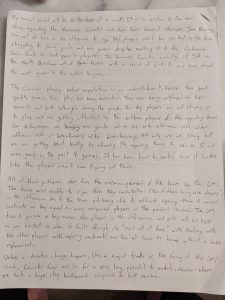
Two words that summarize my experience of completing the manual script: Hand cramps. Being someone who normally writes by type, I guess my hands were not used to the task of writing manually so I found the task difficult as the muscles in my hand started cramping as those hand muscles are not used often. From listening to the podcast by Harris (2018) and how he mentioned that written works took months to complete, I can’t imagine how laborious that undertaking was. I guess it makes sense that the work was worth the annual salary of an average laborer.
I prefer to write by type over by hand because I find the process faster and also neater as my writing is quite messy and small. Being left-handed in a society with a written language that reads from left to right, writing by hand created some difficulties when I was growing up so whenever I had the chance to type my work instead of handwriting it, I took it. Whether from needing to twist my wrist so that I don’t touch the coils of notebooks or needing to lift my hand to avoid smudging when using markers, I always disliked the task of writing. Thinking back to the time prior to the printing press, I wonder how lefties handled the task of manually writing books? I also wonder why, even for societies with a written language that reads from right to left (like Chinese), right-handed people are still preferred to the point where parents would convert left-handed people to become right-handed at a very young age? If you have seen Chinese calligraphers, you would notice that their technique and grip of their writing tool is different from how we hold a pencil, and I think part of that is to prevent the smudging that lefties encounter when writing and to accommodate right-handed writers.
I think the most significant difference between writing by hand compared to mechanized forms of writing is that mechanized forms of writing allows us to produce written works faster and, as mentioned in the YouTube video about the letterpress (Cooke, 2012), allows for instant changes and edits to the work, be it in content or in style. The drawback to this is that I find writers today may not plan as well because they know that they can simply go back and make changes afterwards and no one would know. The video mentioned how, with the letterpress, much like when writing by hand, you must plan your way forward and I think that there is value to that as it makes us think more about the process before we start writing. With that said, I still prefer mechanized forms of writing as I value speed and efficiency over careful planning as I can go back and make changes after if my plan falls through.
References:
Cooke, D. [Danny Cooke Freelance Filmmaker]. (2012, January 26). Upside Down, Left To Right: A Letterpress Film [Video]. YouTube. https://www.youtube.com/watch?list=PLwDcrXJd8qmYTILdpa3XIyRtOFQvQAlXj&v=n6RqWe1bFpM
Harris, B. (Producer). (2018, February 5). How It Began: A History of the Modern World – The Printed Book: Opening the Floodgates of Knowledge. https://howitbegan.com/episodes/the-printed-book/